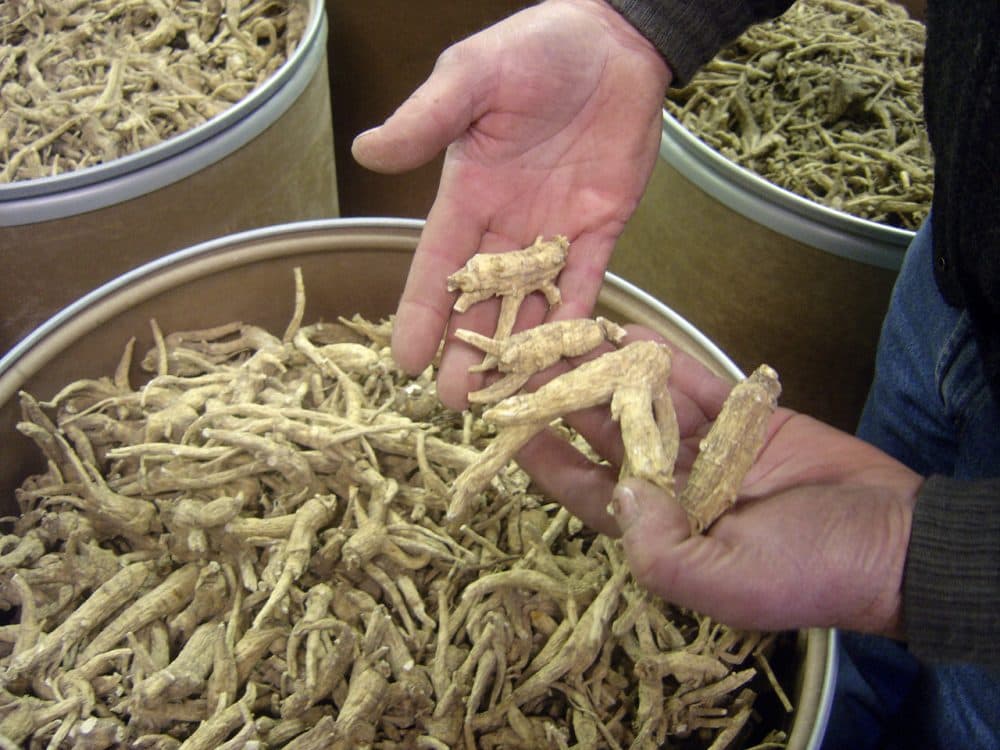Advertisement
Chinese Tariff On American Ginseng 'Definitely Concerning,' Wisconsin Farmer Says

China's tariffs on U.S. goods target 128 U.S. products, including almonds, wine and ginseng, which is facing a 15 percent tariff. The root, used in herbal remedies and teas, is very popular in Asia.
Nearly all of the ginseng grown in the U.S. is shipped to China — and almost all of it is grown in Marathon County, Wisconsin, a county that went for President Trump in 2016. One of the farmers there is Jim Schumacher, co-owner of Schumacher Ginseng, a midsize family farm in Marathon.
"It's very concerning," Schumacher tells Here & Now's Robin Young of the tariff. "I don't like to see tariffs in anything, and to have it hit a little industry like ours here in Wisconsin, it definitely is concerning."
Interview Highlights
On whether he's done the math to determine the tariff's impact on his business
"Really, you know, it depends on the size of the farmer. But the industry here in Wisconsin probably shipped about around $30 million worth of ginseng to China last year. So, it ends up being a large amount for the farmers here in Wisconsin.
"I can [figure out the impact], I haven't penciled it out yet, but, you know, it definitely amounts to a lot. And the problem is it's not just the 15 percent tariff. It's, will the price raise also for the consumers in China? Once you bring it in there, obviously the price is 15 percent higher, we're gonna take the 15 percent, so is it gonna affect the amount of ginseng we sell also?"
On Wisconsin-grown ginseng's history
"This type of ginseng that we grow here in Wisconsin is the American, or the Panax quinquefolius species. The cultivating industry started here in Wisconsin in the early 1900s, and for 75 years, Wisconsin grew 95 percent of this type of ginseng worldwide. And the trade began in the early 1900s with China, and the ginseng that we grow here in Wisconsin like I said is the American species, which is different than the Chinese- or Korean-grown ginseng. If you look at the way it's used in traditional Chinese medicine, ours is considered more of a cooling-type herb, whereas the Korean- or Chinese-grown ginseng is considered a stimulating or a hot type of ginseng."
On ginseng market fluctuations
"For about 75 years, almost all of that type of ginseng was grown here in Marathon County in Wisconsin, until around the 1990s, that's when all of a sudden the market was flooded with a lot of ginseng coming out of Canada. For the Chinese customer, the Wisconsin-grown ginseng is still considered the premium quality ginseng, and if you look on the market, we definitely command a higher price."
On the mood in the county amid talk of a trade war with China
"Obviously we're not happy with that. I don't agree with any type of tariff placed on any products, but obviously when it comes back and hits our industry like that, obviously, we're very concerned about it. We don't wanna see a decline in the crop here. It had fluctuated over the years, and over the last 10 years, we've kinda stabilized here and the industry was going well. So you don't like to see something like this happen."
On this reaction coming despite Trump's anti-free trade rhetoric on the campaign trail
"Maybe [people just didn't hear it], and maybe they didn't expect it to go this far. A lot of the things said on the campaign trail were more threats and things like that, I would think, and you just don't expect it to materialize, probably. So it's just ... you know, when it affects your industry, you definitely feel it a lot more."
This article was originally published on April 03, 2018.
This segment aired on April 3, 2018.